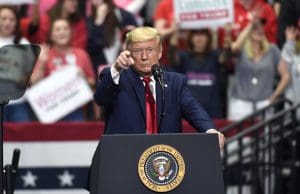Here's what Trump was really doing when he was ignoring coronavirus
Donald Trump spent February golfing and holding campaign rallies while downplaying the seriousness of the coronavirus.

On Tuesday morning, Sen. Lindsey Graham (R-SC) joined several other Republicans to falsely assert that Democrats engaged in dangerous behavior when they impeached Donald Trump on charges of abusing his power and obstructing Congress. Graham implied that the impeachment trial might have distracted Trump from focusing on the coronavirus crisis.
“When it comes to the month of February, most Democrats and the media were more worried about impeaching President @realDonaldTrump than coronavirus,” Graham tweeted. “We voted to acquit President Trump on February 6. During that time, Democrats were making witness requests which — if they had been granted — would have extended the trial through most of February,” he added. “Very sad, very dangerous.”
A look at Trump’s schedule in February shows that any distraction caused by his impeachment did not prevent him from things like attending campaign rallies and playing golf — instead of on protecting the country from the mounting crisis.
On Jan. 31, Trump issued travel restrictions on travelers coming into the United States from China, where the new coronavirus was first discovered.
The next two days, Feb. 1 and Feb. 2, Trump went golfing at Trump International Golf Club in West Palm Beach, Florida.
On the same day as that second outing, Trump spoke about the coronavirus, saying, “We pretty much shut it down coming in from China.” He added, “We’re gonna see what happens, but we did shut it down, yes.”
A few weeks later, on Feb. 15, Trump went back to the same course to go golfing again.
In addition to golfing, Trump flew around the country holding campaign events in February. He held rallies in Manchester, New Hampshire (Feb. 10), Phoenix, Arizona (Feb. 19), Colorado Springs, Colorado (Feb. 20), Las Vegas, Nevada (Feb. 21), and North Charleston, South Carolina (Feb. 28).
When he wasn’t hitting the links or standing in front of crowds, Trump made repeated efforts to downplay any potential impact of the ongoing outbreak on Americans.
“The Coronavirus is very much under control in the USA,” Trump tweeted on Feb. 24.
Two days later, Trump predicted that the number of total cases in the U.S. would soon dwindle to zero, praising his own response to the pandemic.
“When you have 15 people [who are sick], and the 15 within a couple of days is going to be down to close to zero,” Trump said. “That’s a pretty good job we’ve done.”
At the Feb. 28 rally in South Carolina, Trump attacked Democrats and the media for, he said, hyping the threat of the growing crisis, and said it was a “hoax.”
Republicans in the past claimed impeachment had distracted Trump, and Congress, from dealing with the outbreak.
In late March, Sen. John Cornyn (R-TX) tweeted that Trump “did lose ‘precious weeks’ forced to defend himself against bogus impeachment charges.”
Sen. Cory Gardner (R-CO) claimed Congress did not pay enough attention to the growing crisis because of its involvement in impeachment proceedings.
Given that Trump was acquitted in his Senate impeachment trial on Feb. 5, his golfing and campaigning schedule after that date indicates that, if impeachment had been a distraction to him before, it was not enough of one to interfere with his activities following his acquittal.
Trump’s response to the pandemic has been roundly criticized as both slow and chaotic.
Rep. Katie Porter (D-CA), a member of the House Oversight Committee, released a report showing Trump failed to properly stockpile medical supplies in preparation for a pandemic.
“We basically wasted two months,” Kathleen Sebelius, who managed the country’s health care system as health and human services secretary under President Barack Obama, told the Associated Press. Sebelius criticized the Trump administration for blaming states for the lack of medical equipment.
“States do not have the purchasing power of the federal government,” she said. “They do not have the ability to run a deficit like the federal government. They do not have the logistical power of the federal government.”
Despite the fact that hundreds of thousands of people are sick and tens of thousands have died due to COVID-19 in the United States, Trump continues to praise his own response.
“I’d rate it a 10,” Trump said on March 16. “I think we’ve done a great job.”
At a Monday White House briefing, Trump played a video touting his own response and alleging the media — which weeks ago he accused of overhyping the coronavirus threat — minimized the threat.
As of Monday morning, more than 580,000 people in the U.S. have tested positive for COVID-19, and at least 23,607 people have died.
Published with permission of The American Independent Foundation.
Recommended

Biden campaign launches new ad focused on Affordable Care Act
Former President Trump has said he wants to do away with the popular health care law.
By Kim Lyons, Pennsylvania Capital-Star - May 08, 2024
Ohio doctors fear effects of emergency abortion care case set to go before U.S. Supreme Court
A federal law that allows emergency departments to treat patients without regard to their ability to pay will be under U.S. Supreme Court scrutiny this week, and Ohio doctors are concerned about the case’s local impact on emergency abortion care.
By Susan Tebben, Ohio Capital Journal - April 23, 2024
House GOP votes to end flu, whooping cough vaccine rules for foster and adoptive families
A bill to eliminate flu and whooping cough vaccine requirements for adoptive and foster families caring for babies and medically fragile kids is heading to the governor’s desk.
By Anita Wadhwani, Tennessee Lookout - March 26, 2024












































































